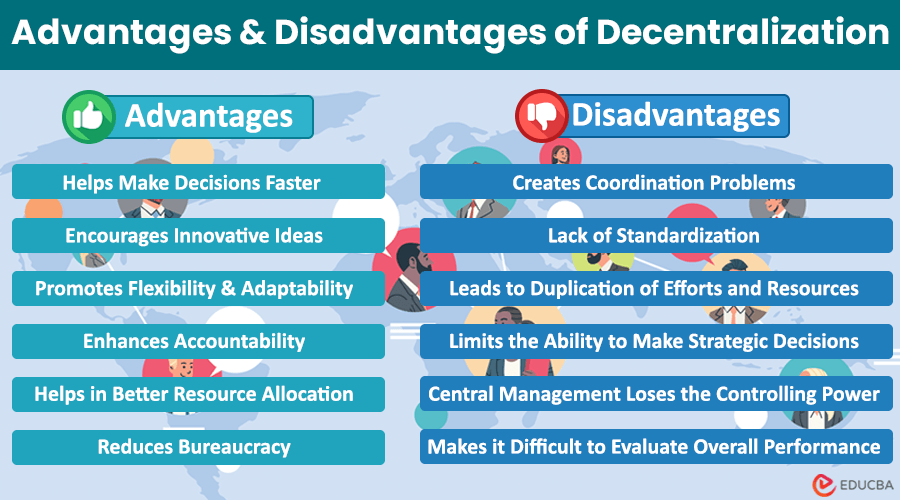
Introduction to Advantages and Disadvantages of Decentralization
Decentralization means distributing power or control from a single central authority to its subordinates. Let’s understand this concept in a better way with an example.
Imagine a group of 10 friends planning a camping trip. In a centralized approach, only one person will decide where to go, what to bring, and how to get there. This person will be the group leader; the entire trip could be in trouble if the leader makes a mistake or becomes unavailable.
Now, instead of one person being in charge, the group collectively makes decisions by assigning a team of 2 friends. Each team is assigned various roles and responsibilities; for example, one team will search for location, another will be responsible for arranging food, and so on. This is a decentralized approach.
Here, the group distributes decision-making authority to each team. Even if one friend of a team is not available, then the trip will still proceed. While a decentralized system has many benefits, it also has a few drawbacks. In this article, you will learn the top 12 advantages and disadvantages of decentralization.
Advantages of Decentralization
Let us look at some of the advantages of decentralization:
1. Helps Make Decisions Faster
In a decentralized system, decision-making power spreads across different levels of hierarchy, individuals or teams. This means a single individual or a team is responsible for making decisions related to specific tasks. In this way, organizations can make faster decisions to meet customer needs more effectively.
2. Encourages Innovative Ideas
Decentralization promotes innovation by allowing individuals or teams to share ideas and try new approaches. Trying innovative ways of doing a task can reduce potential risks.
3. Promotes Flexibility and Adaptability
Decentralized systems allow individuals or teams to quickly adapt to new situations. This means they can react faster to new information or circumstances, letting groups change their plans quickly when necessary. In a centralized system, it is difficult to implement a sudden change in the entire organization, and this can adversely affect productivity.
4. Enhances Accountability
In decentralization, each team is accountable or directly responsible for the outcomes of their actions. It is because each team has the decision-making power to prioritize the organization’s best interests.
5. Helps in Better Resource Allocation
This means that instead of one central authority deciding how to distribute resources, each individual, group, or community gets to decide based on their own needs and preferences. It ensures that the practical use of resources efficiently reaches the target places and people.
6. Reduces Bureaucracy
Decentralization simplifies decision-making by removing unnecessary layers of approval. This helps organizations work faster and better without hurdles and delays.
Disadvantages of Decentralization
Let us look at some of the disadvantages of decentralization:
1. Creates Coordination Problems
Decentralization can lead to difficulties in coordinating between different individuals and departments. This coordination problem can cause inefficiencies and delays in decision-making.
2. Lack of Standardization
Decentralization can result in a lack of uniformity, meaning there is no standard process rule or procedure across various units or locations. This can create variations in product quality, delivery services, and operations.
3. Leads to Duplication of Efforts and Resources
Decentralization can lead to duplication of resources and efforts, as different units may independently pursue similar goals without proper coordination. This can result in waste and inefficiency.
4. Limits the Ability to Make Strategic Decisions
An organization alone cannot make decisions, as decision-making power lies among different units. This limits the ability to make strategic decisions, resulting in a risk of conflicting strategies and duplicated efforts, preventing the organization from maximizing its potential.
5. Central Management Loses the Controlling Power
In the decentralization approach, the central management system will lose the controlling power and lack transparency in decision-making processes. This loss of control may lead to difficulties implementing strategic changes or enforcing policies uniformly.
6. Makes it Difficult to Evaluate Overall Performance
It is challenging to evaluate the performance of individuals or departments within an organization. An organization cannot use standardized metrics to evaluate different departments, making it tough to consistently assess overall organization effectiveness and reward top-performing units.
Final Thoughts
Decentralization is a system where different groups make decisions, encouraging new ideas and involvement. But it can also make it challenging to coordinate and distribute resources fairly. As we move ahead, finding the right balance between the advantages and disadvantages of decentralization will be important for progress in many areas.
Recommended Articles
We hope this “Advantages and Disadvantages of Decentralization” article was informative. To learn more, refer to our articles below.
